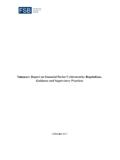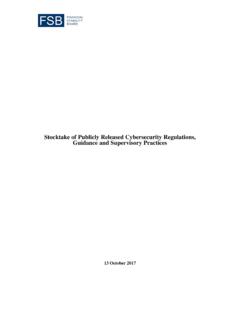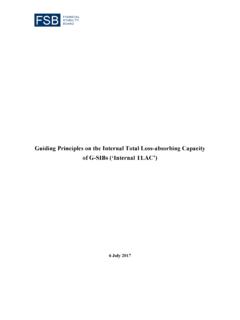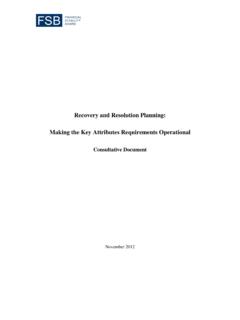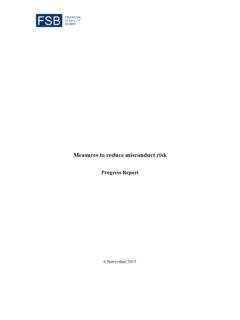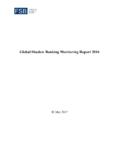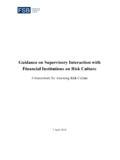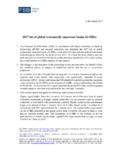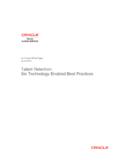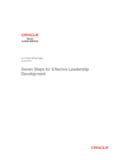Transcription of FSF Principles for Sound Compensation Practices
1 FINANCIAL STABILITY FORUM FSF Principles for Sound Compensation Practices 2 April 2009 FINANCIAL STABILITY FORUM FSF Principles for Sound Compensation Practices Table of Contents 1 I. 2 1. effective governance of Compensation .. 2 2. effective alignment of Compensation with prudent risk taking .. 2 3. effective supervisory oversight and engagement by stakeholders .. 3 II. Commentary on the Principles .. 4 Annex Members of the FSF Compensation FINANCIAL STABILITY FORUM 1 Introduction1 Compensation Practices at large financial institutions are one factor among many that contributed to the financial crisis that began in 2007. High short-term profits led to generous bonus payments to employees without adequate regard to the longer-term risks they imposed on their firms.
2 These perverse incentives amplified the excessive risk-taking that severely threatened the global financial system and left firms with fewer resources to absorb losses as risks materialised. The lack of attention to risk also contributed to the large, in some cases extreme absolute level of Compensation in the industry. These deficiencies call for official action to ensure that Compensation Practices in the financial industry are Sound . While national authorities may continue to consider short-term measures to constrain Compensation at institutions that receive government assistance, it is essential that steps also be taken immediately to make Compensation systems as a whole Sound going forward.
3 To date, most governing bodies (henceforth board of directors ) of financial firms have viewed Compensation systems as being largely unrelated to risk management and risk governance. This must change. While voluntary action is desirable, it is unlikely to effectively and durably deliver change given competitive pressures and first-mover disadvantage. The global supervisory and regulatory infrastructure is an appropriate vehicle for making Sound Compensation Practices widespread. The FSF Principles for Sound Compensation Practices are intended to apply to significant financial institutions, but they are especially critical for large, systemically important firms.
4 They will be implemented by firms and will be reinforced through supervisory examination and intervention at the national level. Authorities, working through the FSF, will ensure coordination and consistency of approaches across jurisdictions. The Principles are intended to reduce incentives towards excessive risk taking that may arise from the structure of Compensation schemes. They are not intended to prescribe particular designs or levels of individual Compensation . One size does not fit all financial firms differ in goals, activities and culture, as do jobs within a firm. However, any Compensation system must work in concert with other management tools in pursuit of prudent risk taking.
5 1 In April 2008, the Financial Stability Forum (FSF) recommended that regulators and supervisors work with market participants to mitigate the risks arising from remuneration policies. The FSF formed a Compensation Workstream Group in late 2008 with a mandate to draft Sound practice Principles for large financial institutions. FINANCIAL STABILITY FORUM 2 I. Principles The FSF Principles for Sound Compensation Practices aim to ensure effective governance of Compensation , alignment of Compensation with prudent risk taking and effective supervisory oversight and stakeholder engagement in Compensation .
6 The benefits of Sound Compensation Practices will be achieved only if there is determined and coordinated action by national regulators, facilitated if necessary by suitable legislative powers and supported by national governments. 1. effective governance of Compensation The board of directors of major financial firms should exercise good stewardship of their firms Compensation Practices and ensure that Compensation works in harmony with other Practices to implement balanced risk postures. The Principles need to become ingrained over time into the culture of the entire organisation. 1. The firm s board of directors must actively oversee the Compensation system s design and operation.
7 The Compensation system should not be primarily controlled by the chief executive officer and management team. Relevant board members and employees must have independence and expertise in risk management and Compensation . 2. The firm s board of directors must monitor and review the Compensation system to ensure the system operates as intended. The Compensation system should include controls. The practical operation of the system should be regularly reviewed for compliance with design policies and procedures. Compensation outcomes, risk measurements, and risk outcomes should be regularly reviewed for consistency with intentions.
8 3. Staff engaged in financial and risk control must be independent, have appropriate authority, and be compensated in a manner that is independent of the business areas they oversee and commensurate with their key role in the firm. effective independence and appropriate authority of such staff are necessary to preserve the integrity of financial and risk management s influence on incentive Compensation . 2. effective alignment of Compensation with prudent risk taking An employee s Compensation should take account of the risks that the employee takes on behalf of the firm. Compensation should take into consideration prospective risks and risk outcomes that are already realised.
9 4. Compensation must be adjusted for all types of risk. Two employees who generate the same short-run profit but take different amounts of risk on behalf of their firm should not be treated the same by the Compensation system. In general, both quantitative measures and human judgment should play a role in determining risk adjustments. Risk adjustments should account for all types of risk, including difficult-to-measure risks such as liquidity risk, reputation risk and cost of capital. FINANCIAL STABILITY FORUM 3 5. Compensation outcomes must be symmetric with risk outcomes. Compensation systems should link the size of the bonus pool to the overall performance of the firm.
10 Employees incentive payments should be linked to the contribution of the individual and business to such performance. Bonuses should diminish or disappear in the event of poor firm, divisional or business unit performance. 6. Compensation payout schedules must be sensitive to the time horizon of risks. Profits and losses of different activities of a financial firm are realized over different periods of time. Variable Compensation payments should be deferred accordingly. Payments should not be finalized over short periods where risks are realized over long periods. Management should question payouts for income that cannot be realized or whose likelihood of realisation remains uncertain at the time of payout.

